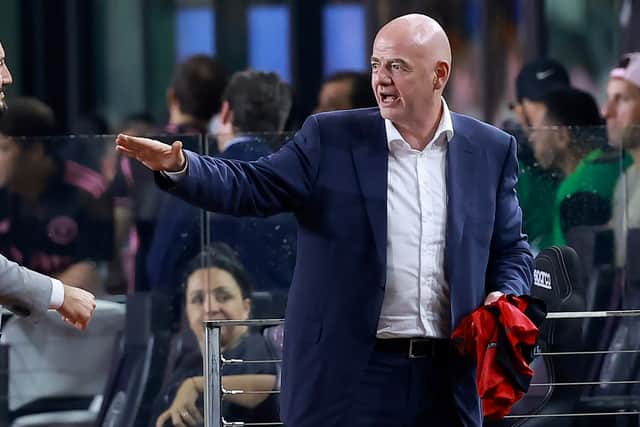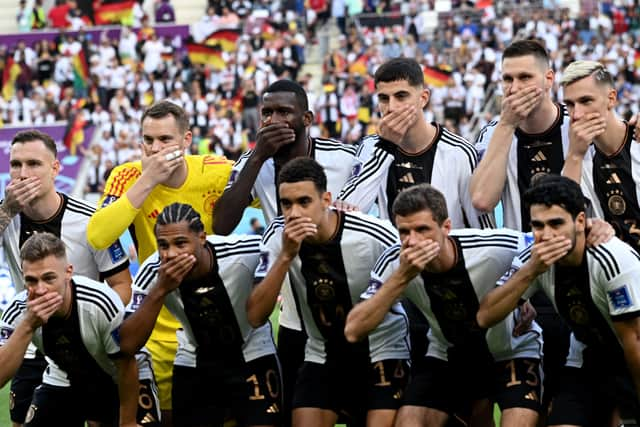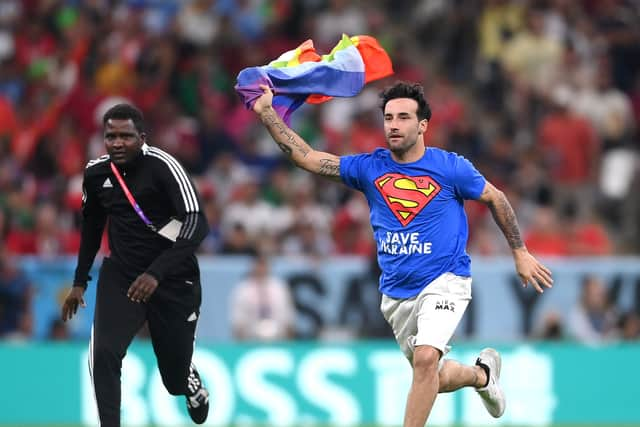The 2030 World Cup will again be hosted where LGBTQ+ life is illegal - will anything change?
and live on Freeview channel 276
FIFA’s decision to host the 2030 World Cup across six countries and three continents has already drawn criticism for the potential environmental impact that the travel involved will have – but it also marks another World Cup that will be hosted, at least in part, in a country where homosexuality is criminalised.
In Morocco, one of the three primary hosts alongside Spain and Portugal, consensual sexual acts between same-sex partners are illegal and punishable by up to five years in prison and a fine. In Paraguay, one of three South American countries which will host a match in the opening round of fixtures to mark the centenary of the first World Cup in Uruguay, reports from rights groups suggest that members of the LGBTQ+ community face an increased risk of violence and discrimination while also enduring reduced rights – same-sex marriage is illegal, for example, and trans people cannot change their name or gender identity on official documents.
Advertisement
Hide AdAdvertisement
Hide Ad

FIFA’s hosting decision comes less than a year after the 2022 World Cup in Qatar, another country where same-sex relationships are illegal and where the LGBTQ+ community faces persecution. Ahead of that tournament, FIFA insisted that LGBTQ+ fans travelling to Doha would be safe and while the Qatari state refused to offer specific assurances that local laws concerning sexuality and ‘morality’ would not be enforced, it did state that visitors were welcome “regardless of their race, background, religion, gender, sexual orientation or nationality.” That did not necessarily match up with the reality on the ground - in the end, there were numerous reports of venue security confiscating pride flags, rainbow armbands and similar pro-LGBTQ+ paraphernalia and detaining the people bearing them, while FIFA banned teams from wearing pride-specific rainbow armbands during their games.
It remains unclear whether Morocco or Paraguay will be safe places for LGBTQ+ fans to visit – while FIFA’s bidding regulations incorporate a vague clause stating that the organisation itself will observe “safeguarding principles for the protection of children and adults at risk” and respect for “internationally recognised human rights”, sexuality and gender are not mentioned explicitly and the regulations appear to bind only FIFA, not host nations.
Whatever adaptations Morocco and Paraguay may be prepared to make for hosting the World Cup, there are at least some issues for LGBTQ+ travellers visiting the country now. The International LGBTQ+ Travel Association advises visitors to Morocco that while “[the law] is not always enforced, it’s smart to use street sense and avoid PDAs… Transgender travellers should be especially aware of potentially abusive behaviour, particularly to transgender women.”


Of course, homophobia and transphobia are issues, to at least some extent, in every country. The 2026 World Cup will be jointly hosted by the United States – not a country usually seen as hostile to LGBTQ+ visitors, but still one in which five states have passed laws in recent years restricting access for transgender people to appropriately-gendered toilet facilities. It may be impossible for FIFA to host a World Cup in a country where LGBTQ+ fans can be entirely safe at all times, but it is still concerning that they are happy to repeatedly host their showcase events in countries where the very lives of fans both visiting and in the country are criminalised. Given that FIFA’s hosting arrangement for the 2030 World Cup is almost certainly designed in part to ease Saudi Arabia’s path to the tournament in 2034, it is likely that FIFA will have arranged (at least) three out of four World Cups in countries in which people cannot be themselves without fear of legal reprisals.
Advertisement
Hide AdAdvertisement
Hide AdParts of the concern over FIFA’s processes for deciding their host nations for major tournaments centre on whether they adequately consult with the LGBTQ+ community either globally or locally ahead of the rights being awarded. Those concerns loom large over the decision to host the tournament in Morocco as well. It is, of course, hard to engage with the affected communities in countries where their sexuality is criminalised, as they are not often able to present a public face, but it is unclear as to whether FIFA has tried.
Dr. Lewis Turner, a Lecturer in the International Politics of Gender at Newcastle University, was sceptical about FIFA’s work ahead of the 2022 World Cup in considering the safety of LGBTQ+ communities: "Although I followed the issue closely, I honestly couldn’t say whether their views were appropriately considered by FIFA… I would assume probably not.
“There’s a real problem here – how does anyone know? If people are ‘underground’ or anonymous, why would they trust FIFA to keep their identities safe? I don’t think I would. I’m not sure if there’s much evidence that FIFA fundamentally cares about such things.”
During his infamous “today I feel gay” speech in November 2022, FIFA president Gianni Infantino told the world that “I am defending football and injustice. Who actually cares about these issues? FIFA does. Football does. The World Cup does” – but if the hard yards to consult and consider LGBTQ+ issues around the World Cup were done, it was not very visible. It is not enough, after all, for FIFA to simply state that it cares about LGBTQ+ rights – it has to take actions in line with that statement. In any case, Infantino somewhat undermined his credibility on the matter of inclusivity by comparing growing up with “ginger hair and freckles” to the struggles endured by marginalised communities.
Advertisement
Hide AdAdvertisement
Hide AdIn response to questions regarding the consultation and consideration of LGBTQ+ fans ahead of the awarding of the 2030 World Cup, a FIFA spokesperson told 3 Added Minutes: “Since November 2017 FIFA has been integrating far-reaching human rights requirements in its bidding and hosting processes. These include the evaluation of human rights risks by FIFA prior to host selection, and contractual obligations for all entities involved in the organisation of the competitions to respect and protect international human rights. These requirements are widely considered the most elaborated system of this kind…
“During the bidding processes, FIFA will engage on human rights matters with a wide range of stakeholders in the bidding countries, and all relevant reports will be made available.”
It will be instructive to see whether FIFA steps up its attempts to publicly address concerns voiced by the wider LGBTQ+ community, and whether it attempts to engage the Moroccan and Paraguayan governments and football associations over concerns regarding the safety of visiting fans – but while concerns were focused on visitors ahead of Qatar, the worries they faced should not have been the only point of discussion, and nor should they be ahead of the World Cups in Morocco and, potentially, Saudi Arabia. LGBTQ+ residents of those countries face an even more serious and certainly more persistent threat to their freedoms and often their lives.


Dr. Turner suggested that the focus in the Western media ahead of Qatar 2022 was wrongly placed too closely onto travelling fans: “I felt alienated from quite a lot of that debate because although there was a focus, at least rhetorically, on the fact that gay sex is criminalised in Qatar, it felt like in a lot of the media discourse and public discussion the situation for LGBTQ+ Qataris was secondary to the experiences of LGBTQ+ football fans from other parts of the world.
Advertisement
Hide AdAdvertisement
Hide Ad“There was a wildly disproportionate focus on the experiences of people who had the money and time to travel across the world in pursuit of this leisure activity, rather [than on] supporting LGBTQ+ people in Qatar. There has to be a step change in whose experiences and lives get prioritised.
“Being able to watch football is not as important as the lives and safety of LGBTQ+ people living in a repressive state. It’s almost a year since the World Cup and I’ve barely heard any discussion about LGBTQ+ people [in Qatar] in the Western media since then. It drops off the agenda. Perhaps to an extent that’s inevitable, but I think it’s emblematic of the short-termism of it. How could FIFA or football associations build relationships with LGBTQ+ people in states such as Qatar, when everyone knows that FIFA can, and will, leave?"
FIFA’s decision to host World Cups in countries where travelling fans face potential persecution for their sexualities and genders deserves criticism and pushback – but as long as the focus remains solely on fans travelling from overseas, it misses the most serious victims in countries where basic rights and freedoms are stripped from their own citizens. And as long as FIFA continues to host major football tournaments in countries where people face such a reality, it will always risk implying support for those regimes and strengthening their positions on a global level.
There must be pushback ahead of Morocco, Paraguay and likely Saudi Arabia – but while that pushback needs to include the rights and safety of travelling fans, it must not lose sight of the people who suffer the most.
Comment Guidelines
National World encourages reader discussion on our stories. User feedback, insights and back-and-forth exchanges add a rich layer of context to reporting. Please review our Community Guidelines before commenting.
